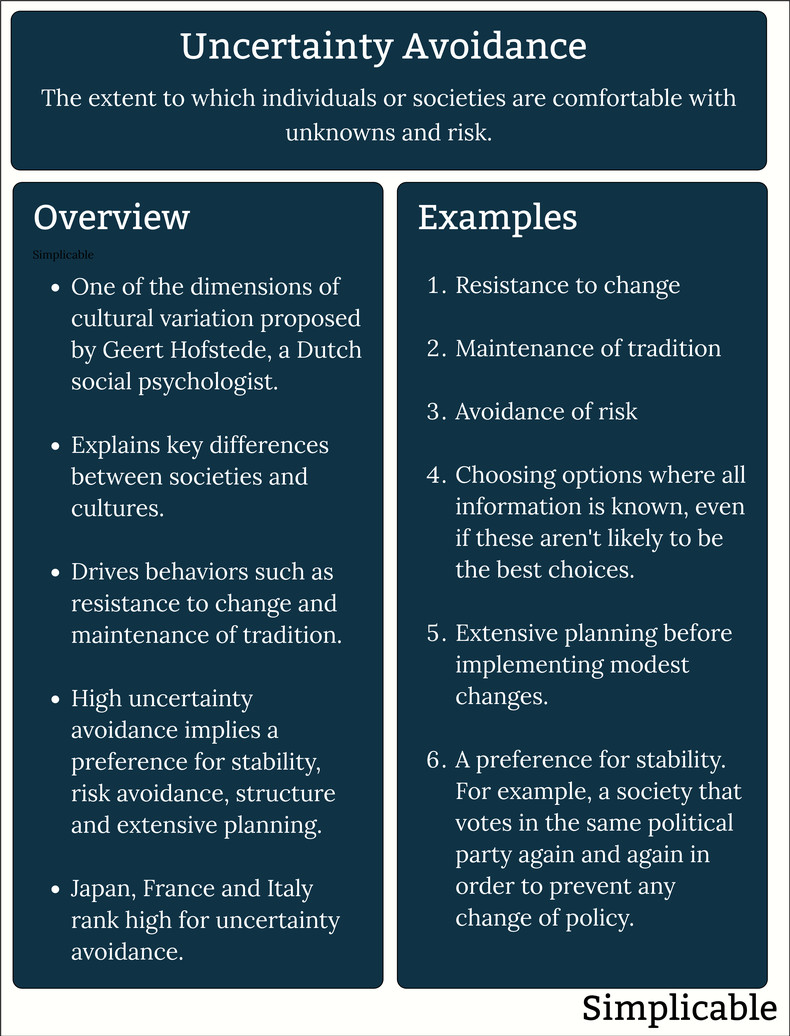
Conventional Ideas
Uncertainty avoidance is associated with strong belief in conventional ideas.Loyalty
Loyalty to institutions and established entities. For example, customer loyalty to well established brands may be stronger in a nation with high uncertainty avoidance.Rules & Procedures
Strict systematization of things such that everything follows a predictable rule or procedure.Risk Tolerance
Low levels of risk taking and systems that afford safety and security. For example, nations with high uncertainty avoidance may have systems of lifetime employment whereby dismissals are rare and turnover is low.Power Structures
Strict hierarchical power structures such that people at the bottom are unlikely to question authority. This avoids uncertainty by giving everyone a clearly defined role.Tradition
Maintenance of tradition such that culture changes slowly.Formalities
An uncertainty avoiding culture may feature many social norms that guide social interaction such as rules of politeness.Politics
Citizens in an uncertainty avoiding culture may be disengaged from politics. A political party may retain power for a long period of time as people may vote against change as opposed to voting based on the performance of the government.Creativity
An aversion to brave ideas, particularly from low ranking individuals. Organizations with high uncertainty avoidance may attempt to create formal systems for creativity such as an executive who is responsible for innovation.Planning
Detailed planning and organization.Diligence
Uncertainty avoidance is associated with detail-oriented workers who work diligently such that they are relatively unlikely to make mistakes or take shortcuts.Change
Uncertainty avoidance is one of the primary drivers of resistance to change, a common tendency to try to derail changes that threaten the status quo.Summary
Uncertainty avoidance is the degree of comfort with unknowns and risk. This is a way to capture the key differences between societies, cultures, organizations and individuals.
Notes
The term uncertainty avoidance is primarily associated with Geert Hofstede, a Dutch social psychologist, who theorized that uncertainty avoidance is one of the primary dimensions that explain the differences between cultures and societies.The other dimensions of Hofstede's theory are: power distance, individualism versus collectivism, masculinity versus femininity, long term versus short term orientation and indulgence versus restraint.Nations that score high for uncertainty avoidance include Greece, Portugal, Italy, Spain, Belgium, Poland, Japan, France, Argentina, Chile, Turkey and South Korea.Nations that score low for uncertainty avoidance, indicating they are comfortable with uncertainty, include Singapore, Denmark, Sweden, China, United Kingdom, India, Malaysia and the United States.Countries that score neither high nor particularly low include Germany, Canada, Australia, Norway and Netherlands.| Overview: Uncertainty Avoidance | ||
Type | ||
Definition | The level of stress that an organization, society or culture experiences when faced with uncertainty and ambiguity. | |
Attributed To | Gerard Hendrik Hofstede | |
Related Concepts | ||
































